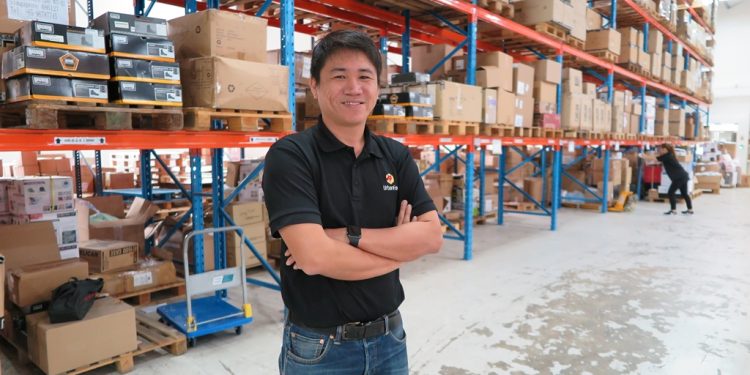As e-stores and e-marketplaces continue to rise in numbers, consumers in Asia are increasingly buying into the convenience of online shopping and attractive discount codes. According to the Singapore Department of Statistics, Asia-Pacific accounted for almost half of the US$1.9 trillion (S$2.5 trillion) business-to-consumer (B2C) e-commerce sales worldwide in 2016.
What does this mean for the logistics industry? Over the past five years, it has been contributing about seven per cent of Singapore’s gross domestic product and providing 230,000 jobs.
In October 2017, Keppel Logistics, the logistics arm of Singapore-listed Keppel Telecommunications & Transportation made its foray into B2C with the acquisition of Courex Pte Ltd (rebranded as UrbanFox). Promising growth opportunities aside, B2C presents new challenges.
Managing Director of UrbanFox Joe Choa explained: “Traditionally, logistics mainly deals with business-to-business exportation but now it’s B2C. They are totally different – if I have 1,000 parcels, there are 1,000 people waiting for it versus a company that bought 1,000 things and only have one customer waiting.
“Consumers want free shipping, real-time tracking, SMS notification, next-day or even same-day delivery… All these expectations translate to cost. That is why we need to increase our operational efficiency to generate enough profits and remain sustainable.”
Crowdsourcing & IT
With e-commerce taking up 95 per cent of the business, the demand for UrbanFox’s delivery vehicles fluctuates drastically. For instance, it saw up to a 10-fold surge in delivery volume during cyber sales on 11 November and 12 December 2017.
To tackle that, Joe maintains what he calls a flexible fleet at UrbanFox, with 80 per cent of its vehicles serviced by more than 12,000 crowdsourced partners in its delivery programme.
“This is not much different from 10 years ago when companies have a pool of subcontractors whom they manually call one by one to check for availability. Now, we are just improving the process through automation,” said Joe.
UrbanFox also built an IT system to manage its delivery schedules and partners in 2013. Its team of software engineers has since grown from one to 10. The IT system is able to handle more than 10,000 deliveries daily.
Going forward, the engineers are working on a new loyalty system with perks for their delivery partners, as well as more productivity enablers such as automated guided vehicles and conveyor belts.
Value-Adding to Retailers
According to International Enterprise (IE) Singapore, the logistics scene in Southeast Asia has seen numerous start-ups like deliveree and GIZTIX entering the market as well as interest from logistics giants such as Cainiao in recent years.
IE Singapore Transport and Logistics Group Director Law Chung Ming advised: “To be competitive, Singapore logistics firms have to continue to embrace innovation and provide integrated solutions, as this presents a stronger value proposition and scaling potential. For example, logistics companies can engage retailing platforms and big brands to enhance their physical fulfilment services with channel management services. Retailers are turning to a multichannel approach to target customers more effectively and provide a seamless shopping experience.”
With the help of IE Singapore, Economic Development Board and SPRING Singapore, UrbanFox has been extending omnichannel and digital solutions – an emerging business trend that was identified in the Logistics Industry Transformation Map (ITM) launched 16 November 2016.
Besides warehousing and inventory management, UrbanFox helps businesses to sell their products across marketplaces such as Lazada and Shopee as well e-commerce platforms such as Magnento and Shopify. This way, UrbanFox’s customers are able to minimise idle inventory and manage their logistics needs from a single touchpoint.
Chung Ming added that companies should also collaborate with e-services and logistics firms.
He said: “To capture new opportunities, our logistic firms can partner e-services firms to build digital capabilities and offer value-added solutions such as digital marketing, data analytics and payment. Logistics firms can apply insights to help e-commerce businesses understand buying patterns and maintain end-to-end visibility of their operations. They can also partner other logistics companies with different capabilities to strengthen the breadth and depth of fulfillment capabilities. This will allow our companies to meet the increasing requirements for specialised logistics such as cold chain logistics.”
Scaling Up
In support of the ITM’s long-term goal to help the industry achieve a value-add of $8.3 billion and create 2,000 new professionals, managers, executives and technicians jobs by 2021, IE Singapore launched the Professional Conversion Programme (PCP) – Southeast Asia Ready Talent on 26 September 2017 to help logistics firms build a strong pipeline of Singaporeans with specialist logistics knowledge and market-ready skills for the region.
To support its new offerings, UrbanFox has had 12 new hires since its launch in October 2017, including three from PCP. It is looking at expanding overseas later this year.

